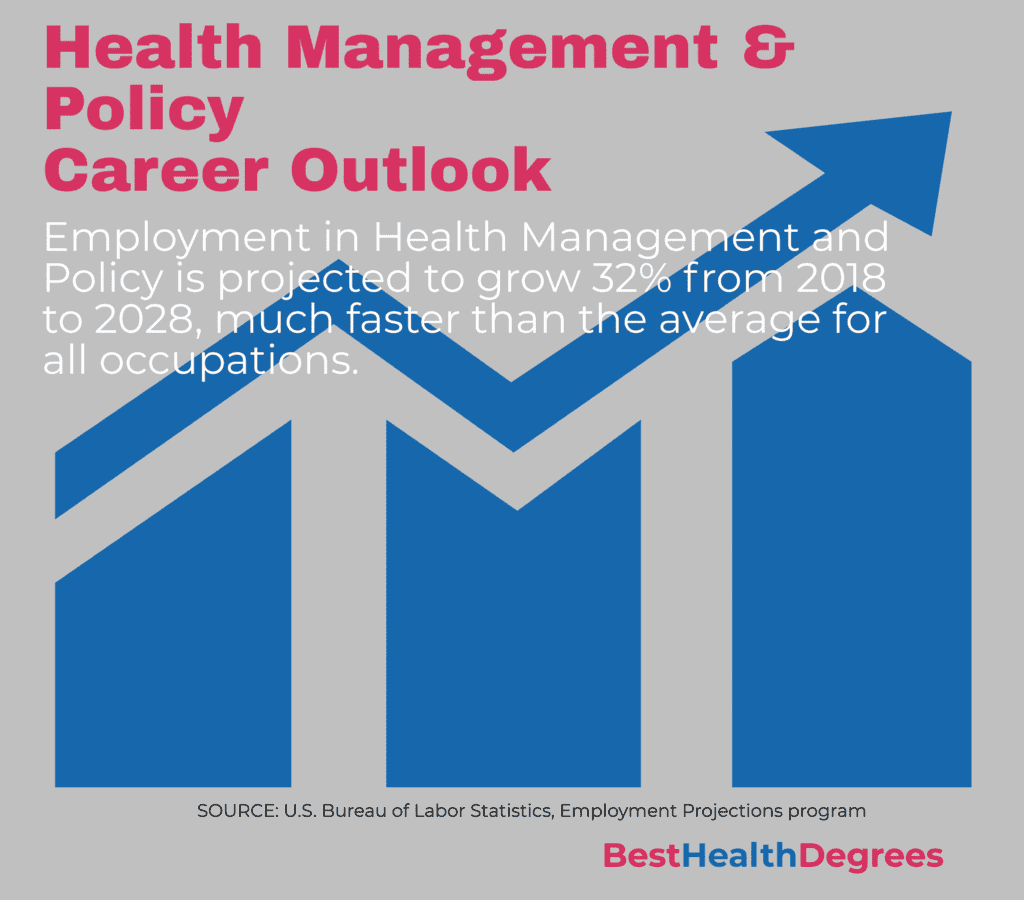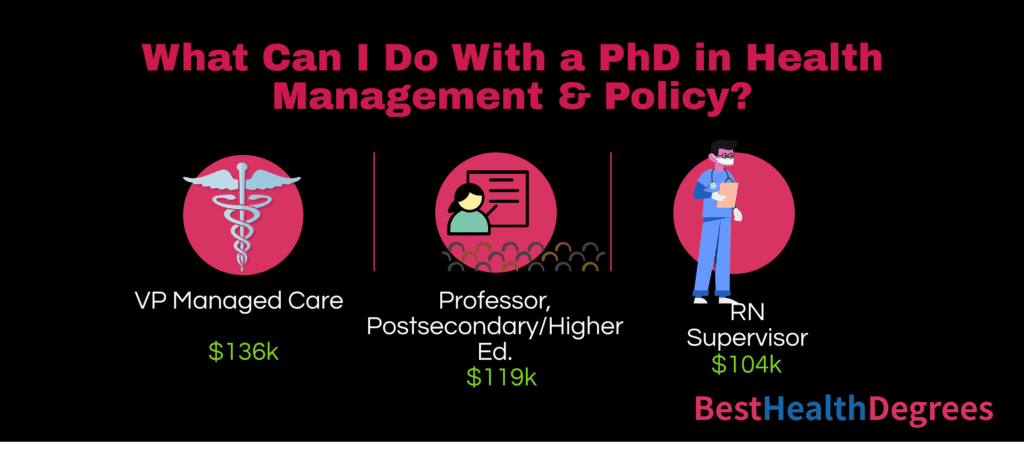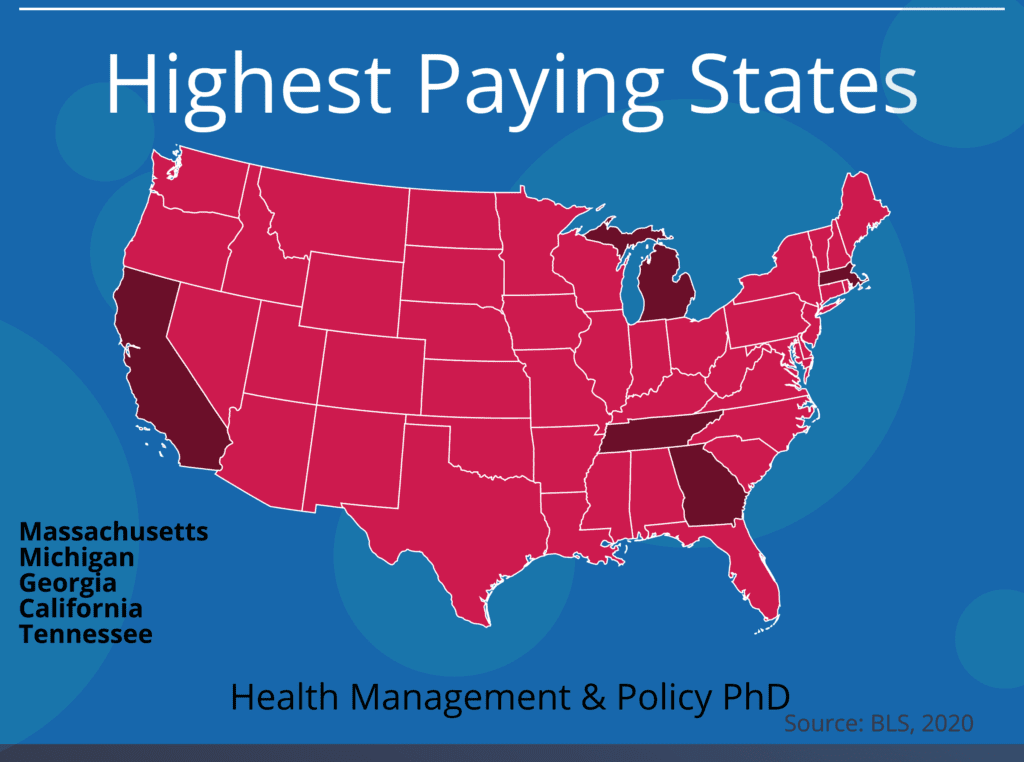Key Takeaways:
- Holding a PhD in Healthcare Administration can lead to high earning potential and diverse career opportunities. Graduates can pursue roles as hospital administrators, health services managers, or policy advisors, with salaries often exceeding $100,000 depending on the position and location.
- The degree also opens doors to academic and research positions, allowing professionals to influence healthcare policies and systems.
- The comprehensive education and specialized training prepare graduates for senior-level and executive roles in healthcare settings.
Leadership in the field of health policy and management requires extensive knowledge, experience, and judgment. Health management covers a wide variety of services and opportunities. This is one of the reasons it is important to find the answers to these questions you may have. Before considering a doctorate in health management and policy you may wonder:
- Is health information management a good career choice to meet my career objectives?
- Can I meet my financial objectives by reaching for the health management careers that interest me?
- What are available careers in health management?
Degree candidates enrolled in a doctorate-level degree program in health management can enter the healthcare field ready to work. They can work as researchers in both the private, public and academic environments.
Health management and policy researchers have the responsibility of investigating health care systems from many essential perspectives. The goal is identifying and improving health care disparities in public and private health systems. Ph.D. programs in health management and policy cover the complexities of health care costs, quality, and access affected by –
- Social factors
- Financing and available capital
- Health care organizational structures
- Health care technologies, to name a few
Health management and policy focuses on populations, groups, healthcare institutions, and defined communities.
Accreditation for Health Management and Policy Programs
The concept of accreditation refers to a standardized process by which neutral-third-party. An organization or agency (governmental or industry-related) evaluate academic facilities and its offerings against a standardized set of criteria to determine if a school or program meets the academic muster. Ultimately, the objective of accreditation is to –
- Protect the public by requiring higher learning institutions to be held accountable by requiring they open their facilities and academic curricula to a neutral accreditation agency and process. This process ensures that the quality of the education promised/advertised is the same education a student receives.
- Improve the overall academic quality of education in the United States.
It is noted that the accreditation process – the continuation of the quality control – is renewed, on average, every five to ten years, depending on the level of accreditation and the industry standards. In the United States, there are two fundamental levels of accreditation – Regional Accreditation and Specialized Accreditation. These are discussed below.
Regional Accreditation
The United States Department of Education is the federal oversight agency comprised of nine regional agencies that manage the regional accreditation process through the United States’ divided regions. Each federal, regional agency is responsible for administering the accreditation processes to those higher learning institutions located with that regional agency’s boundaries.
Generally speaking, institutions of higher education that are awarded regional accreditation are predominantly state-funded, nonprofit schools, although not always. In addition to regional accreditation, professional schools, colleges, and universities – and their programs can voluntarily seek specialized accreditation. Although not mandated, most quality institutions of higher learning seek to earn specialized accreditation from an industry-approved agency.
Specialized accreditation is typically awarded by industry-sanctioned oversight organizations, developed to ensure accreditation assessments are fair, just, and accurate. Health Care Management Accreditation is discussed next.
Specialized Accreditation – Health Care Management Accreditation
The CAHME – the Commission on the Accreditation of Healthcare Management Education
The CAHME – the Commission on the Accreditation of Healthcare Management Education is the accreditation benchmark used for employers and students alike – that speaks to the fact that students with degrees awarded by the Commission on the Accreditation of Healthcare Management Education accredited schools/programs have been appropriately prepared to be future healthcare management leaders. This agency serves the public by –
- Setting forth measurable standards that define excellence in healthcare management education.
- Making this accreditation information easily accessible to relevant students, educators, and employers.
- Maintaining membership with the Association of Specialized & Professional Accreditors (ASPA)
- Maintaining membership with the ASPA Code of Good Practice.
Members of the Commission on the Accreditation of Healthcare Management Education hail from a cross-section of inter-related health care groups that include –
- Health care clinicians.
- Health care professionals.
- Health care managers and administrators.
- Health care educators, among others.
It is also essential to notify the reader that the Commission on the Accreditation of Healthcare Management Education holds the distinction of being the ONLY accreditation organization sanctioned by CHEA (the Council on Higher Education Accreditation) with regard to professional graduate and post-graduate degrees in healthcare management and policy.
Types of Health Management & Policy Doctoral Degrees
A Health Policy and Management PhD program is typically appealing to health care-minded thought leaders who want to focus their careers in the betterment of healthcare organizations, developments, and structures. Many healthcare managerial professionals and health services managers have tremendously busy careers, so an online health care management PhD degree program is often most appealing because it an online health care management PhD degree candidates flexibility when pressed for time.

Any degree candidate for a doctorate in health policy can opt for either on campus health management doctoral programs or health management doctoral programs online. However, there are two types of health management PhD programs from which to choose –
- A PhD in Health Management – a PhD in Health Policy and Management focuses on medical research; however, this Health Care Management PhD degree program typically present their work and conclusions to medical/academic communities. From behind the scenes, those who attain a PhD in Health Policy and Management online, on-campus, or as a hybrid program, help prepare the next generation of health care managers and leaders.
- A Doctor of Health Administration (DHA) – those who earn this type of PhD in Health Care Policy and Management online or by a hybrid program seek to work on real-world problems impacting health care in the here and now.
Both PhD health management degree programs prepare degree candidates for the upper management levels of the health care field, which includes the exploration of the organizational nuances that buck conventional theoretical wisdom. The advanced research and study offered by a PhD in health management online program, health care managers, refine their skills at –
- Problem-solving.
- Problem identification
- Innovative resource allocations
- Confident decision-making
- Conflict mediation experts
Careers in Health Management and Policy
So, you have finally concluded that a career in health management and policy will meet your educational, financial, and career objectives. But what kind of jobs are available if you earn this health administration degree? What are the available PhD in health policy jobs with my background, education, and within my commuting area? What kinds of medical facilities can I work in with a healthcare administration degree? Have you asked and answered the question – What can I do with a PhD in health policy? And is it better than a master’s degree?
Students enrolled in a doctoral health management and policy degree program explore the theories, concepts, and research that prepares candidates to become the next generation’s health care industry leaders in any healthcare organization. However, students generally must make a choice as to which of the many health care management facets they find holds the most interest. Among the choices are a career in –
- Research
- Politics
- Academia
- Public health
- Facility management
Courses taught in post-graduate health administration programs require incredible skills that promote communication and innovation in problem-solving. As such, health management and policy professionals are typically thought to be creative, out-of-the-box thinkers, collaborative types, and self-starters.

However, prior to making our final decision, be sure you know what you can do with a PhD in health policy before enrolling in any program! A doctoral level degree program in health management a policy offers degree candidates a wide variety of academic emphases and concentrations. These include, in part, the following –
Academic Concentration & Descriptions
- Health Policy & Advocacy – Degree candidates explore how to improve healthcare ideologies and organizations through research methodologies. Many degree holders work in governmental policy-making at various levels influencing the access, availability, and exposure of health care to populations throughout the country.
- Healthcare Analytics – Degree candidates primarily work within the regulatory/compliance areas of healthcare, using metrics to monitor patient and staff safety.
- Bioethics – Degree candidates explore the ethical impacts of health care policy making using empirical research methodologies. Among the issues addressed are infectious diseases, obesity, emergency preparedness & population health, among others.
- Healthcare Leadership – Degree candidates explore the ways to direct organizational change using empirical evidence-based data. Ethical decision making is also explored.
- Quality & Patient Safety – Degree candidates explore the many theories available for improving care to patients in all types of clinical environments.
- Health Economics & Policy – Degree candidates explore and apply modern financial and economic modeling in the evaluation of public econometric policies and interventions.
- Clinical Manager – Degree candidates explore the many functions required to keep a clinic working according to legal guidelines and with a profit margin.
PhD in Health Policy and Management Salary
The Bureau of Labor Statistics (BLS), a federally funded agency that manages incredible amounts of labor statistics from across the country, notes that overall, health care occupations are anticipated to grow at a 15% pace through 2029, which is considered significantly faster than the average of all United States occupations combined for the same timeframe.
The field of health care is recognized as one of the country’s fastest growing job markets. Because of the tremendous diversity, the health care field has, the highest paying jobs in health policy generally fall within the subspecialties within the field. According to Payscale.com, the average salary for someone who holds a doctorate in health care administration or management is $92,500 per year. A hospital chief financial officer, for instance, can make over $150,000, while a hospital chief executive officer can make more than $300,000.
The Factors That May Influence Health Management & Policy Salaries
Similar to most industries, there is a list of factors that influence the salary one receives, having earned a doctoral degree in health management and policy. Among these factors that may impact one’s compensation package are –
- The exact nature of one’s health management position.
- One’s level of education plus additional licenses, credentials, and other certifications.
- One’s previous relevant work and life experience.
- One’s personal and innate skills and abilities.
- The exact facet of the health services administration industry.
- The job growth potential of the health management/policy job chosen.
A PhD health policy and management salary – for those who enter the healthcare arena as a Medical or Health Services Manager, can expect that the median annual salary (2019) for a health or medical service manager was $100,980, which translates to $48.55 per hour. However, the most impressive is the job growth rate anticipated by the BLS statisticians through 2029 of 32% – about eight times as fast as the average growth rate of all U.S. combined occupations. In addition, this 32% job growth rate is expected to generate more than 125,000 new jobs over the next decade.
| Medical & Health Services Jobs by Best Paying State | PhD in Health Policy Salary |
|---|---|
| District of Columbia | $150,040 per year |
| New York | $147,000 per year |
| Hawaii | $133,320 per year |
| California | $133,040 per year |
| Massachusetts | $132,960 per year |
A PhD in Health Policy Salary – for those who enter the health care arena in the area of academia, will often perform research and teach at a university, college, or professional school that specializes in the many facets of health care and the healthcare industry. As a college educator, those who hold a doctoral level degree in health care management and policy will find the median health policy PhD salary will be $79,540 per year, with an anticipated job growth rate of 9% – about twice the United States average of all occupations combined.
| Health Education Specialist Job by Best Paying State | PhD in Health Policy Salary |
| District of Columbia | $92,630 per year |
| Georgia | $86,110 per year |
| Rhode Island | $77,210 per year |
| Maryland | $77,150 per year |
| Hawaii | $73,610 per year |
In addition, a PhD in health management or policy may also lead to these well-paying and rewarding careers –
| Health Policy and Management Careers | PhD in Health Policy Salary |
| Biostatistician | $92,030 per year |
| Epidemiologist | $70,990 per year |
| Emergency Management Director | $74,590 per year |
| Public Health Attorney | $122,960 per year |
| Computer/Information Systems Healthcare Manager | $146,360 per year |
| Environmental Scientists | $71,360 per year |
To help put additional and relevant perspective on the PhD in health policy salary potentials, consider the top paying states for –
Statisticians with a Doctorate in Health Management and Policy
| Statistician Health Care Jobs by Best Paying State | PhD in Health Policy Salary |
| Massachusetts | $119,620 per year |
| New Jersey | $111,410 per year |
| Idaho | $111,000 per year |
| California | $110,240 per year |
| Maryland | $108,660 per year |
Epidemiologists with a Doctorate in Health Management and Policy
| Epidemiologist Health Care Jobs by Best Paying State | PhD in Health Policy Salary |
| Massachusetts | $114,220 per year |
| Washington | $111,160 per year |
| New Jersey | $103,390 per year |
| District of Columbia | $99,940 per year |
| California | $91,800 per year |
Environmental Scientists with a Doctorate in Health Management and Policy
| Environmental Scientist Jobs by Best Paying State | PhD in Health Policy Salary |
| District of Columbia | $112,540 per year |
| California | $92,320 per year |
| Washington | $85,770 per year |
| Virginia | $85,660 per year |
| Colorado | $84,690 per year |

Professional Organizations in Health Management and Policy
The health care industry is forever evolving, which makes it essential for health administration program candidates and students within this field to stay professionally connected to the industry. Like most industries, the health care industry has a number of professional organizations that have been designed to support both the industry and the many professionals working to excel within the healthcare arena.
Each professional organization offers its members a host of services and benefits; however, each organization generally caters and serves a slice or small portion of the entire industry. The professional organizations noted below are considered among the most prominent and valuable for degree candidates, students, and professionals in the health care management industry.
The American College of Healthcare Executives (ACHE)
The American College of Healthcare Executives is comprised of more than 75 regional chapters. With nearly 50,000 members, the American College of Healthcare Executives seeks to the healthcare executive’s trusted partner in making healthcare more affordable, more accessible, and safer for all. Members who join ACHE make a professional commitment to lifelong learning in terms of leadership diversity, inclusion, and integrity. The regional chapters of the American College of Healthcare Executives offer members a plethora of options at the local level that includes –
- Volunteer opportunities for members to become acquainted with community services and members.
- Educational programs and services to create more confident and competent health care executives.
- Job boards and career advancement services, to name a few of the many benefits offered.
Dues are $160 per year for two years, then $265 for the next three years. After year five, membership dues increase to $345 per year.
The National Association of Healthcare Access Management (NAHAM)
The National Association of Healthcare Access Management is a Washington-based professional organization that was developed to ensure the healthcare industry maintains the highest of standards by –
- Promoting the best medical practices
- Establishing subject matter expertise among healthcare professionals working in the industry
To accomplish its objectives, the National Association of Healthcare Access Management provides its members with these important benefits –
- Industry networking functions.
- Workshops and educational opportunities.
- Credential and certification options.
Active memberships – best suited for managerial level professionals have a yearly fee of $102.50. Associate members – suited for non-managerial professionals is $65 per year.
The AAHAM – the American Association of Healthcare Administrative Management
The American Association of Healthcare Administrative Management, founded in the late 1960s as the American Guild of Patient Account Management, has grown to become one of the healthcare management’s most prominent organizations. The mission of the American Association of Healthcare Administrative Management is to be the healthcare manager’s one-stop for important and relevant resources in the areas of –
- Professional networking.
- Certification and credential opportunities in coursework and exams.
- Advocacy, support, and mentorship in relevant areas.
- Education and workshop options are designed specifically for health care managers tasked with the responsibility of revenue cycle management.
Full time students (with a minimum course load of 12 semester credits) may join for free, with limited, non-voting benefits. National membership costs $209 per year, which can be prorated depending on the time of year you choose to join the American Association of Healthcare Administrative Management.
The Healthcare Financial Management Association (HFMA)
The HFMA – the Healthcare Financial Management Association, is a professional organization with more than 55,000 members dedicated to helping its members meet their financial performance expectations offering pragmatic solutions and techniques to financial managers in the healthcare industry. The Healthcare Financial Management Association offers tremendous educational opportunities and certifications that include –
- Chapter and national conferences
- In person and online seminars
- E-learning opportunities, among others
The Healthcare Financial Management Association benefits students – offering a reduced $50 yearly membership fee. New member fees for the Healthcare Financial Management Association are offered on an organization level or several levels of membership that cost between $175 to $495, depending on the level selected.
The American Health Information Management Association (AHIMA)
The American Health Information Management Association is a professional organization for those who are dedicated to pursuing a career in health information management. Members of AHIMA – the American Health Information Management Association have access to valuable resources and helpful tools/techniques that will facilitate the professional’s goal of raising the standards of care offered. The American Health Information Management Association differs from other healthcare management professional organizations as it primarily focuses on providing and developing systems that improve the standards of care provided by healthcare professionals. The AHIMA – the American Health Information Management Association, offers a variety of industry credentials and certifications that include –
- CCHIM – Commission on Certification for Health Informatics & Information Management, plus another eight related certifications.
The annual membership fee for new members to AHIMA is $79/year for the first two years. A premier membership in the American Health Information Management Association is $199, a student membership is $49, and an active membership is $135 per year. Global members must be $109 per year for a membership.
Related Rankings:
